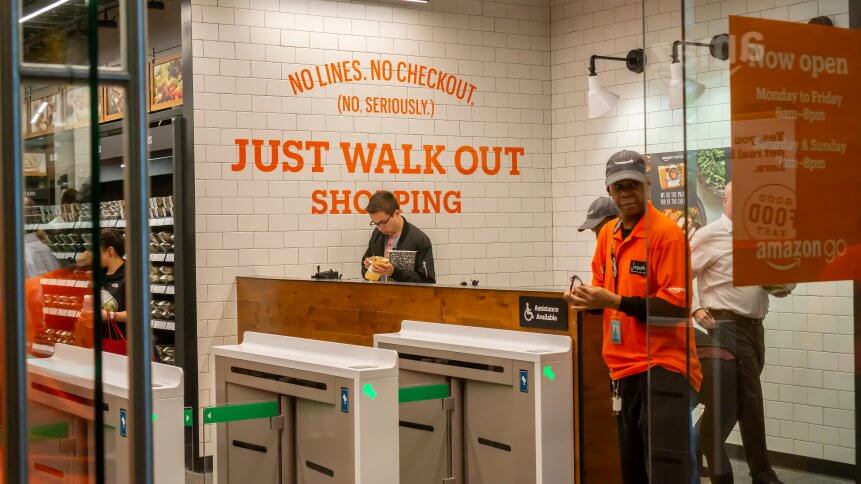Amazon Just Walk Out tech move divides opinion

Amazon recently announced a new business line selling the Just Walk Out technology which powers its Amazon Go stores.
And now OTG, which operates over 350 restaurants and retail locations in North American airports, has said it will be one of the first retailers to adopt the tech.
The first store, a CIBO Express Gourmet Market, was set to open this month in Newark Liberty’s Terminal C. This will eventually be followed by additional ones in both Newark Liberty and LaGuardia airports.
“We all saw this coming; develop it, test and learn, launch, launch again in different store formats and then sell it to the global retailers,” retail tech veteran Steve Lister said in a LinkedIn post.
“Why would Amazon open their own stores? This is an incredible lesson in how you can throw a tonne of money at something and then sell it to all the retailers who wanted it. Great business model and will secure re-occurring revenues for decades to come. Shrewd move but what else did we expect from Amazon?”
It won’t be for everyone, however. Amazon is the enemy for many retailers. Letting them tap your data would be a big strategic risk.
Meanwhile, Jordan Fisher, Co-founder and CEO of Amazon Go challenger Standard Cognition, points out that Amazon still cannot retrofit stores – and that’s a much larger market than greenfield stores – likely by a factor of 100x, he reckons.
“We have talked with every major retailer in the US, Asia and Europe,” says Fisher. “They all want to retrofit existing stores. Very few are willing to build new stores around technology, and that’s what Amazon requires.”
His company has retrofitted three US stores for a customer. The two plan to reveal details later this spring. Standard’s frictionless checkout solution relies only on ceiling-mounted cameras to accurately detect what each shopper has when they leave the store, so they can be automatically charged.
As a result, the upfront costs and maintenance costs are a fraction of Amazon’s, Fisher claims, and Standard’s solution can fit in any existing store layout, without major build-outs.
New technology
In a previous article, we looked at how the rise and rise of Amazon has changed everything. Yes, it sells stuff, but it is first and foremost a technology company with deep pockets, an appetite for disruption, and constant dissatisfaction with the status quo.
Many retailers have responded positively to the challenge. As Simon Hathaway, MD at Outform EMEA, notes: “The UK high street has been feeling the pressure of online competition and so has upped its game.
“The elements that have always differentiated physical stores from e-commerce, like personal service and the ability to talk to another human – still remain.
“But now, stores are bringing in new technology like virtual reality, augmented reality and touchscreen functionality to make it even better. Retail has become experiential and shoppers are responding positively.”
54 percent of Brits – rising to 59 percent of men – are interested in trying out new retail technology while on the high street. 50 percent of women are also keen to improve their shopping experience with the latest tech.
Outform surveyed 2,000 people and also found that the in-store retail tech men most want to use are tablets and touchscreens (30 percent), allowing them to find out more about product functionality. 23 percent also say they’d like to try voice-enabled interactive experiences in stores.
In conclusion
Amazon’s Just Walk Out technology business will undoubtedly carve a lucrative niche for itself. But it won’t have everything its own way. Major retailers will not licence it. They won’t do anything that makes Amazon even more successful.
And let’s not forget Standard Cognition, Grabango and the many other startups offering checkout free shopping solutions at a fraction of the cost.









